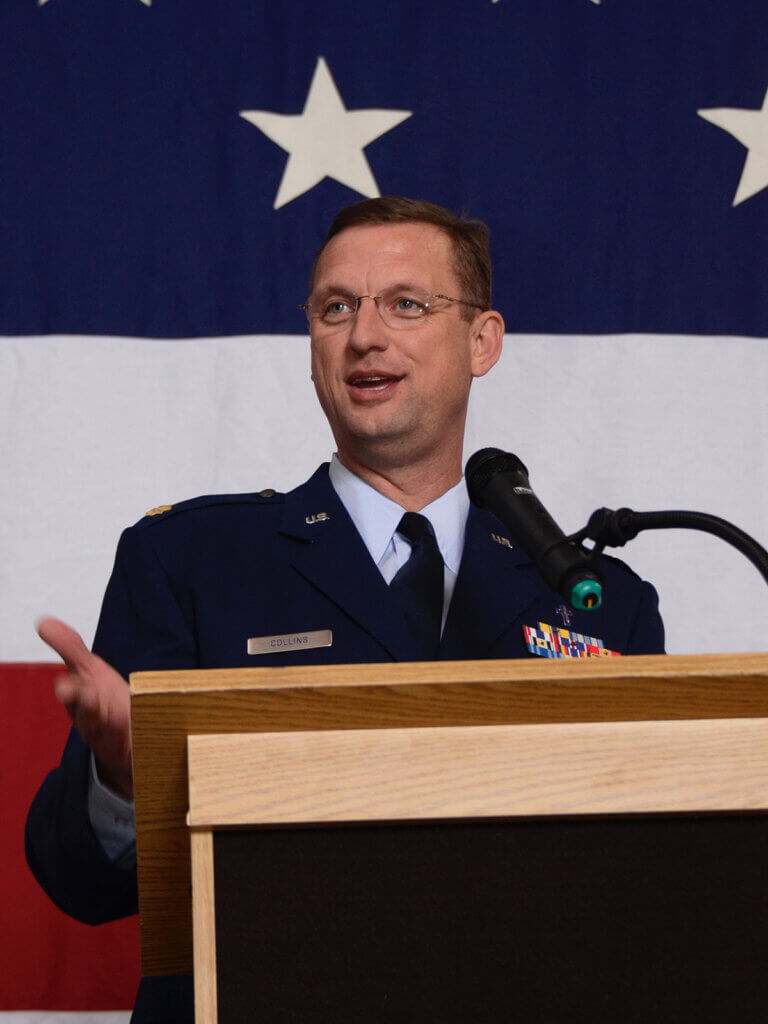After decades of chaplaincy, congressional service and a deeply personal family journey marked by sacrifice and challenges, Air Force Reserve Col. Doug Collins could have stepped away quietly into retirement. Instead, he accepted the job of a lifetime as the secretary of Veterans Affairs (VA) — and the heavy scrutiny that comes with it.
“It was easy,” Collins said of his decision to return to public service. “I missed it.”
But it wasn’t just nostalgia that brought him back; it was a calling, one rooted in both service and lived experience. Years ago, Collins left the Navy Reserve after his daughter was born with spina bifida. In her first five years, she underwent nearly 20 surgeries.
“We had our team doctors in Atlanta and though I wanted to continue, there was just not a lot of ways to do that and make sure she had the care that she needed. My wife and I prayed over it and made the decision that her care had to come first,” he said.
But the desire to serve never left.
Collins reentered the military, this time with the Air Force Reserve as a chaplain in the wake of the attacks of 9/11. After graduating from Atlanta’s John Marshall Law School, he was deployed to Iraq from 2008-2009.
“Yeah, that was interesting,” he laughed. “The year I graduated was the year I went to Iraq. I graduated law school, took the bar exam and shipped to Iraq.”
From there, Collins was a congressman serving as a U.S. Representative for Georgia’s Ninth Congressional District from 2013-2021. Today, he leads one of the largest health care and benefits systems in the world.
Collins is clear-eyed about what’s broken at the VA.
“We’ve become a very organization-centric department,” he said. “We have a lot of people, a lot of buildings, 170 hospitals and 1,200 CBOCs [community-based outpatient clinics] and not to mention our veteran benefit side. But somewhere along the line, we stopped putting the veteran first.”
His top priority? Refocusing the entire system around outcomes for veterans. Whether that’s health care, benefits or access to services, Collins wants the experience to be efficient, human and veteran-led. That means reevaluating how resources are allocated, which roles are essential and how performance is measured, not just in dollars, but in care.
“The GAO [Government Accountability Office] said 10 years ago the VA was high-risk for waste and abuse,” Collins said. “Since then, we’ve added over 100,000 employees and billions in funding. But wait times have gotten worse. So it’s not about more people or more money. It’s about doing it right from the start.”
As a long-time reservist in both the Navy and the Air Force, Collins has a unique understanding of the challenges Guard and reserve members face, not just in uniform, but at home.
“I remember going to Iraq, and the question was always, ‘Oh, you’re a reservist?’” he recalled. “Like somehow that meant we didn’t belong. But I had more time counseling than most of the active-duty chaplains I served with. We were treated like a stepchild of sorts.”
Collins’ family didn’t have the resources and support found traditionally on base for active-duty members, so he knows that reality for reservist families intimately.
“My wife and kids had almost no base experience,” Collins shared. “I’d go do my weekend drills and then head right back to work Monday. No downtime, no transition.”
Collins said the system needs to better reflect these realities. That includes making VA benefits more transparent and accessible for those in the reserve and Guard, especially during the transition from service.
“Too many are coming to us not knowing what they’ve earned,” he said. “We’re losing people between the cracks. That’s when we see homelessness and suicide risk go up.”
A hallmark of Collins’ leadership so far has been his willingness to speak plainly, even when the answers are still forming or unpopular. He’s active on social media and open about where things stand, especially when policy proposals or budget discussions stir panic.
“There’s a hearing coming up, and everyone wants the exact plan,” he said. “Well, I’m not going to scare my veterans or my employees with half-baked ideas. We’ll communicate clearly when we know, not before.”
His stance has earned both praise and resistance, especially around questions of staffing cuts. But Collins is adamant: any reductions will be strategic, not random.
“If you’re touching a veteran, if you’re delivering care — you’re safe,” he said. “But if your role is duplicative or far from the mission, we have to look at that. Decisions need to be made for the veteran, not for the institution.”
So, what does success look like for Secretary Collins?
“It’s veterans wanting to go to our centers,” he explained. “It’s shorter wait times. It’s staff actually helping patients, not just pushing paper. It’s accountability.”
He’s already seeing movement, benefits backlogs are starting to fall and pilot programs using AI to streamline first-time claims have shown promising results. But Collins isn’t just chasing numbers.
“I’d love for people to say: they made the VA veteran-focused again,” he said. “That’s it.”
In a time of high expectations and tighter scrutiny, Collins’ approach is both deeply personal and unapologetically focused. For him, service has never been about the title. It’s about the mission.
“I’m not doing this for myself,” Collins said. “I came back to make things better. That’s it.”

